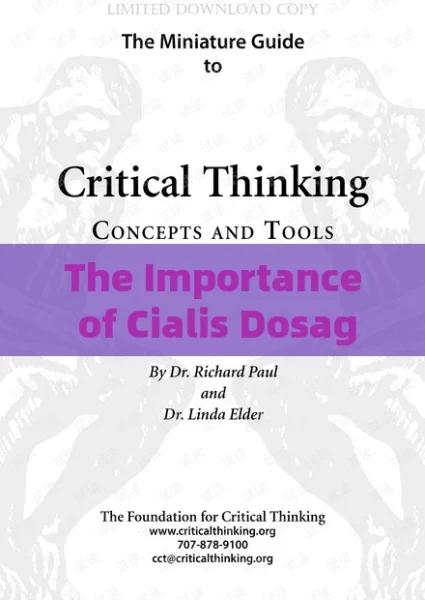The Importance of Cialis Dosage in Erectile Dysfunction TreatmentTitle: Understanding the Importance of Cialis Dosage
Erectile dysfunction is a common condition that affects many men. Cialis is a popular medication used to treat this disorder. Understanding the correct dosage of Cialis is crucial for achieving optimal results. In this article, we will explore the various aspects of Cialis dosage and its significance in erectile dysfunction treatment.
The dosage of Cialis depends on several factors, such as the patient's age, overall health, and the severity of the condition. It is important to consult a healthcare provider to determine the appropriate dosage for individual needs. Studies have shown that the recommended starting dose of Cialis is 10mg, which can be adjusted based on the patient's response.
One of the key benefits of Cialis is its long-lasting effect. It can provide up to 36 hours of erectile function, allowing for more spontaneity in sexual activity. However, it is important to note that the effects of Cialis may vary from person to person. Some men may experience side effects such as headache, back pain, or muscle aches. These side effects are usually mild and temporary.

To ensure the safety and effectiveness of Cialis, it is essential to follow the instructions provided by the healthcare provider. Patients should also be aware of potential interactions with other medications or underlying health conditions. For example, Cialis should not be taken with nitrates, as it can cause a significant drop in blood pressure.
In conclusion, Cialis dosage plays a vital role in the treatment of erectile dysfunction. By understanding the appropriate dosage and following the healthcare provider's recommendations, men can improve their sexual function and overall quality of life. It is important to have open communication with the healthcare provider and address any concerns or questions regarding Cialis dosage. With the right approach, Cialis can be a valuable treatment option for men with erectile dysfunction.
Question: Can Cialis be taken with other medications?
Answer: Cialis may interact with certain medications, such as nitrates. It is important to consult a healthcare provider to determine if there are any potential interactions with other medications you are taking.
In the world of healthcare, medication dosages play a crucial role in ensuring patient safety and efficacy. One such medication is Cialis, a popular treatment for erectile dysfunction (ED). The correct dosage of Cialis is essential for its effectiveness and to minimize potential side effects. In this article, we will delve into the significance of Cialis dosage, discuss various aspects related to it, and provide practical advice for users.
Cialis, also known by its generic name tadalafil, is a phosphodiesterase type 5 (PDE5) inhibitor that helps relax the blood vessels in the penis, allowing for increased blood flow and improved erectile function. It is widely prescribed to men suffering from ED, a condition that affects millions of men worldwide. The importance of Cialis dosage cannot be overstated, as it directly impacts the therapeutic outcome and patients' quality of life.
To understand the relevance of Cialis dosage, it is crucial to comprehend the different factors that influence it. These include age, weight, severity of ED, presence of other medical conditions, and concomitant use of other medications. For instance, older adults may require lower doses due to decreased kidney function, while those with severe ED might need higher doses for optimal results. Additionally, certain medications can interact with Cialis, affecting its metabolism and clearance from the body. Therefore, determining the appropriate Cialis dosage should always be personalized and guided by a healthcare professional.
When discussing Cialis dosage, one must also consider the different formulations available on the market. Cialis comes in various strengths, including 2.5 mg, 5 mg, and 10 mg tablets. The choice of dosage depends on individual patient needs and response to treatment. A common starting point is the lowest effective dose, which can then be adjusted based on patient feedback and clinical outcomes. It is worth noting that some studies suggest starting with a higher dose may provide better results for certain patient populations. However, this decision should only be made after careful consideration of potential risks and benefits.
Another aspect to explore is the timing of Cialis administration. Unlike some other PDE5 inhibitors, Cialis has a longer half-life, allowing for once-daily dosing options. This flexibility can be particularly beneficial for individuals who lead busy lifestyles or have unpredictable schedules. By understanding the pharmacokinetics of Cialis, patients can make informed decisions about when to take their medication to maximize its effects.
To illustrate the importance of Cialis dosage further, let us examine a case study involving John, a 45-year-old man with moderate ED. After consulting his doctor, John was prescribed a 10 mg dose of Cialis to be taken orally once daily. Over time, he noticed significant improvements in his erectile function and overall sexual satisfaction. However, he also experienced some mild side effects, such as headaches and flushing. Upon reviewing his medical history and current medications, his doctor determined that these side effects were likely due to interactions between Cialis and his high blood pressure medication. To address this issue, the dosage of Cialis was adjusted to 5 mg per day, resulting in fewer side effects while maintaining an adequate response to treatment.

In conclusion, understanding the importance of Cialis dosage is vital for achieving optimal therapeutic outcomes in patients with ED. By considering factors such as age, weight, severity of ED, comorbidities, and concomitant medications, healthcare professionals can tailor the dosage to each patient's unique needs. Additionally, being aware of the different formulations and their respective advantages can help guide treatment decisions. As research continues to evolve in this field, future developments may lead to even more personalized approaches to managing ED with Cialis.
Q&A Section:
1、What is the recommended starting dose of Cialis for most patients?
A: The recommended starting dose of Cialis varies depending on individual patient needs and response to treatment. However, a common starting point is the lowest effective dose, typically 2.5 mg or 5 mg per day.
2、Can I adjust my Cialis dosage on my own?
A: No, it is important to follow your doctor's instructions regarding your Cialis dosage. Adjusting the dosage without professional guidance could result in suboptimal therapeutic outcomes or increased risk of side effects.
3、Are there any food or drink restrictions when taking Cialis?
A: While there are no strict food or drink restrictions associated with taking Cialis, it is generally advised to avoid grapefruit juice as it can interfere with the metabolism of the drug and increase the risk of side effects.
4、How long does it take for Cialis to work after taking it?
A: The onset of action for Cialis varies among individuals but typically occurs within 30 minutes to an hour after oral administration. The effects can last up to 36 hours, depending on the dosage and individual response.
Priligy efectos secundarios